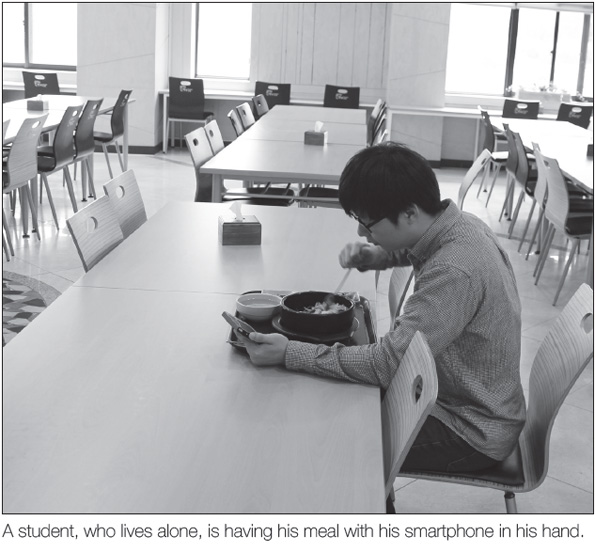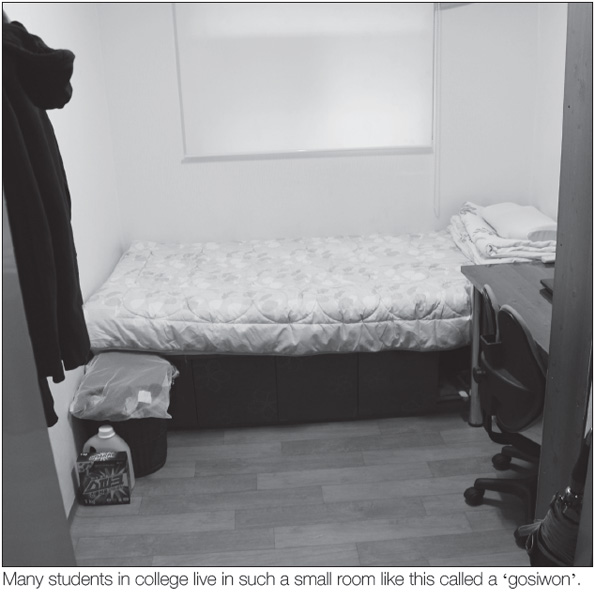Mr. Mo, an anonymous student of CBNU, lives alone, away from his parents, to attend university. He wakes up at 7 A.M. on weekdays for morning classes. He must get up with no one’s help, so he sets his alarm to repeat every 5 minutes. He usually eats his meals at the cafeteria. The reason why he prefers eating his meals at the cafeteria is because eating out is more expensive than eating at the school cafeteria. When he eats alone, he usually watches videos with his smartphone. He also does the shopping by using his smartphone due to the fact that he must purchase his stuff with his limited allowance. He has to research as many items as possible and compare them to make the most economical choice.
Recently, there are more and more university students who live alone. Most of them live in an efficiency room, boarding house or an even smaller room than an efficiency room called ‘gosiwon’ after leaving their hometown for their studies. There are dormitories in most universities, but according to the portal site University Notification, the capacity rate of dormitories of 176 regular universities of the whole country is 19.2%. The Korea Student Aid Foundation investigated that 880,000 out of 2,180,000 students, which is 40.5%, attend school in a different region from their house, and, compared to it, the dormitory capacity rate is low.
Moreover, the popularity of efficiency rooms, rather than dormitory rooms, is growing nowadays because there are many people who prefer living alone to living with others. CBNU student, Kim Jung-woo(’16, Dept. of Nursing Science), who is boarding himself nearby the entrance of our school said, “Since there might be a conflict of opinions when living with a roommate, I chose to live alone.”
There is a finding that people who live alone have lower health quality and poorer residential environments than people in large households. According to the Korea Institute for Health and Social Affairs(KIHASA), 21.6% of young people who live alone have chronic diseases, which is 4% higher than the others’ rates. It turned out that they also go to hospital more often. 72.5% of them have been to hospital while 66.7% of the others have been.
The institute also wrote a report about the present conditions of single-person households of each generation and said that the smoking(32.9%) and drinking(82.1%) rates of young single households overtook the smoking(19.3%) and drinking(67.9%) rates of large households by far. Moreover, the rate of suspected depression in young single households is 7.0%, and it surpasses the rate of large households by 0.8%p, and the ratio of risk of suicide is the highest among all generations. There are also many young single households who said they are living in an improper environment that has a lack of soundproofing, ventilation and heating.
CBNU student Park Seung-min(’14, School of Civil Engineering) is living in a semi-basement. He said, “My room becomes damp with humidity when it is raining. I sometimes ask people to stop smoking outside because the smell doesn’t easily disappear.”
The fact that an increasing number of single households are in poor condition and often sick implies that there’s a lack of policy for them. The CBNU’s professor Lee Hyeon-jeong(Dept. of Housing & Interior Design) said that single households often live in poorer places than large households due to their economic difficulties. “If the resident lives in poor surroundings, the resident will have a health problem so related policies are needed to support them. There are policies for college students such as public dormitory expansions or public rental housing provisions; however, these have limits and are not enough for the students’ healthy livelihood. The college students also have little experience in supporting themselves, so they are often inattentive or negligent to their living or nutrition with their irregular hours, drinking, smoking and lack of healthy habits. They often really don’t know the importance of management until the health problems occur, so more rigid controls are needed.”
By Min Tae-kwan
tk36@cbnu.ac.kr


 All
All Society & Global
Society & Global






 Min Tae-kwan
Min Tae-kwan











